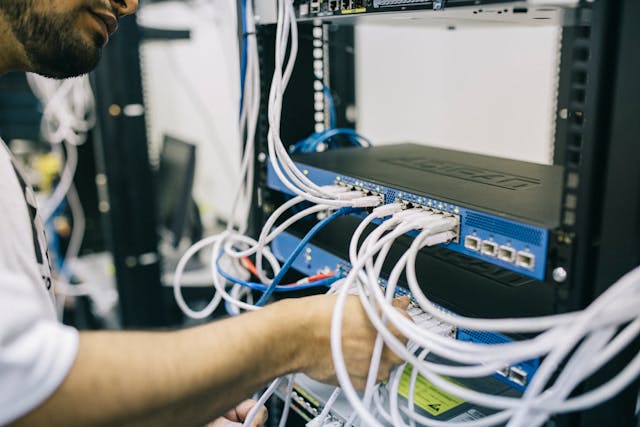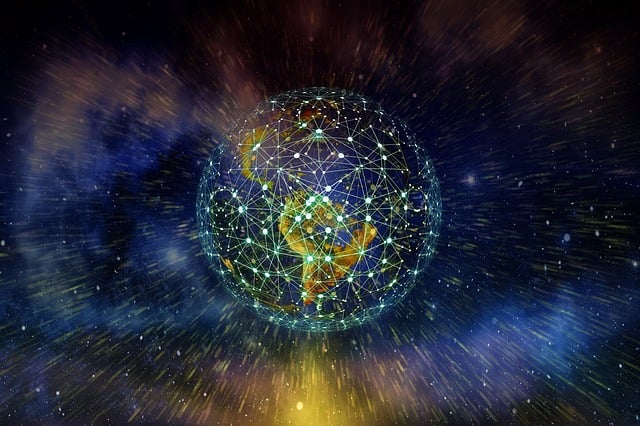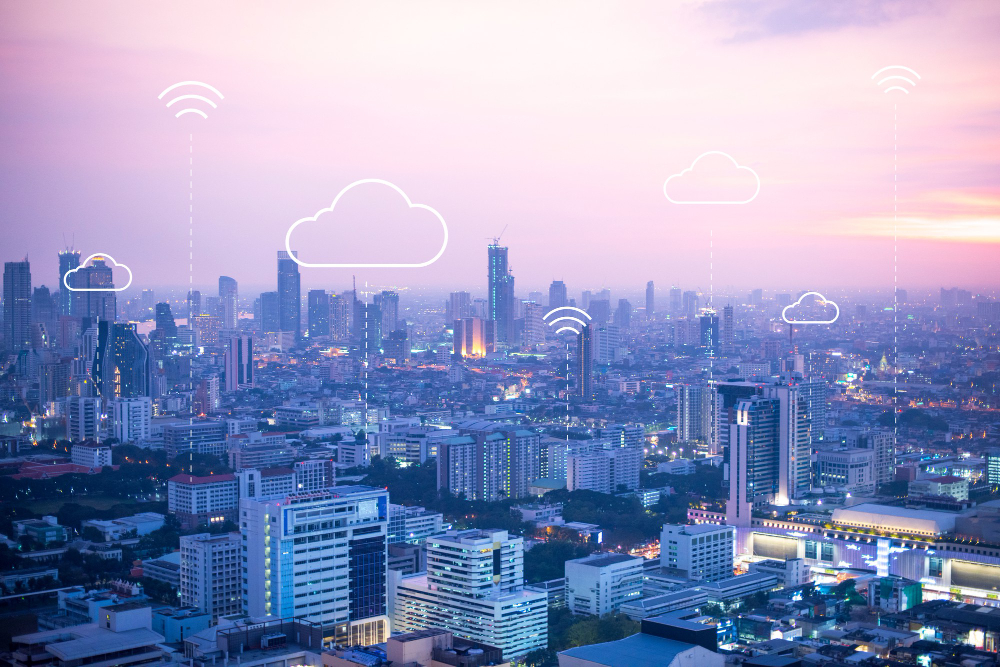International Internet Day: History of Internet
Celebrating International Internet Day, we explore how the internet has evolved from the first “LO” message sent in 1969 to today’s AI-driven, hyper-connected reality. We examine the rise of generative AI, the expansion of the Internet of Things, and the shift to cloud-based living. The future of the internet depends on privacy, trust, and user control—principles at the heart of Koofr’s privacy-first cloud storage solution.
Written by human for humans
On October 29, 1969, a graduate student at UCLA tried to send a simple message: “LOGIN.” Only the first two letters—“LO”—made it through before the system crashed. That imperfect transmission marked the birth of the internet. What began as a moment of failure became one of history’s most consequential successes. On October 29th each year we celebrate that humble start as an International Internet Day.
Fast forward half a century, and the internet experienced another defining moment. The global events of 2020 triggered the most rapid digital transformation in human history. Remote work became standard, e-commerce surged to unprecedented levels, and collaboration platforms redefined how we connect, communicate, and store data. What was once a tool of convenience became the backbone of modern life.
Koofr. Secure and private cloud storage.
Today’s internet is defined by two powerful forces: the explosion of data—driven by artificial intelligence, cloud computing, and hyper-connectivity—and the growing demand for privacy and security. The global conversation has evolved from ensuring access to ensuring control, as we navigate the delicate balance between innovation and protection in a world built on information.

The Internet’s Foundation
The internet is a global network of interconnected computer systems that allows people, machines, and data to communicate across vast distances. At its core lies a universal language known as TCP/IP—the Transmission Control Protocol and Internet Protocol—which ensures that information can travel seamlessly between devices regardless of their origin or destination. In simple terms, TCP/IP makes it possible for every email sent, website loaded, or video streamed to reach its intended recipient accurately and efficiently.
To understand the internet fully, it helps to see it as both a physical and a logical entity:
- The physical internet is made up of tangible components—underground fibre-optic cables, massive data centres, satellites, and network routers—that form the hardware backbone of global connectivity.
- The logical internet, by contrast, consists of the invisible layer of data, protocols, and applications that give the system meaning and function.
Together, these layers create the digital ecosystem that connects billions of people every day.
On October 29, 1969, researchers at UCLA and Stanford exchanged the first digital message over a network known as ARPANET. In 1983, ARPANET officially adopted TCP/IP, linking independent networks into a single, global system and giving rise to what we now call the Internet.
Finally, in 1990, British computer scientist Tim Berners-Lee introduced the World Wide Web, using HTML and HTTP to make the internet accessible and navigable to the public. From those early experiments to today’s interconnected world, the internet’s foundation remains a remarkable testament to human collaboration and innovation.

The Internet of Today: A Post-2020 Reality Check
The internet we inhabit today looks radically different from the one that existed just a few years ago. The pace of innovation since 2020 has redefined not only how we interact online but also how we create, store, and protect information. Three major forces—generative AI, hyper-connectivity, and a permanent shift to digital-first living—now shape this new reality.
The first and most transformative of these is the rise of generative AI. Once confined to research labs, it has become a mainstream phenomenon, powering large language models (LLM), image generators, and countless creative and analytical tools. The key shift lies in AI’s role: it no longer merely analyses existing data, it generates new data at an exponential rate. Every prompt, query, or generated image represents not only computational effort but also a new entry in the world’s growing ocean of digital content. This surge brings immense opportunity but also a critical challenge: how to process, store, and verify the authenticity of this data. As AI continues to create, the demand for secure data provenance and responsible storage intensifies, compounding what experts are calling the global data storage crisis.
Alongside AI’s rise is the rapid expansion of a hyper-connected world powered by the Internet of Things (IoT) and 5G networks. The ultra-low latency of 5G enables billions of devices—wearables, sensors, vehicles, and home systems—to exchange information in real time. This constant data flow has extended the boundaries of the internet to the very edge of human experience. However, as data is generated and transmitted from so many endpoints, it becomes increasingly fragmented and vulnerable. Sensitive information now travels farther and faster, leaving local devices and crossing networks more frequently than ever before, creating new challenges for privacy, security, and governance.
Finally, the digital-first shift that began in 2020 has solidified into a permanent way of life. Hybrid and remote work models have made the cloud the central infrastructure of the modern enterprise. No longer just a backup repository, the cloud is now the primary workspace where collaboration happens, ideas are built, and business operates. Yet this integration also blurs the boundaries between professional and personal data, raising complex questions about ownership, access, and protection. The internet of today is not merely faster or larger—it is fundamentally more entangled with every aspect of human life.

The Defining Challenge: Privacy and Data Control
As our world grows more connected, the cost of that connectivity has become increasingly clear. Cyber threats have evolved in both frequency and sophistication, with ransomware and phishing attacks now targeting individuals, corporations, and even critical infrastructure. Modern ransomware no longer simply locks users out of their systems—it threatens to expose sensitive data to the public, weaponising information for maximum leverage. The result is not only financial loss but also deep reputational harm. In this landscape, recovery isn’t just about restoring access; it’s about rebuilding trust.
Adding to this pressure is a growing web of global regulations designed to safeguard user privacy and hold organisations accountable for how they manage data. Landmark policies such as the European Union’s General Data Protection Regulation (GDPR), the upcoming EU AI Act, and California’s Consumer Privacy Rights Act (CPRA) have reshaped the expectations around data stewardship. These frameworks demand transparency, ethical data use, and user consent—setting a new global standard for compliance.
Privacy is no longer an afterthought; it is a deciding factor in consumer choice. Businesses that prioritise privacy-by-design, implement strong encryption, and ensure transparent data practices are finding that security is not just a regulatory requirement but a competitive advantage. Trust has become the ultimate currency and control over one’s data—the defining challenge of our interconnected age.

Koofr – The Secure Solution: Privacy-First Cloud Storage
In a world where data is constantly on the move, Koofr stands out as a trusted space built on privacy, security, and simplicity. Designed and hosted in Europe, Koofr puts users, not algorithms, in control of their information.
With end-to-end encryption, transparent policies, and no data mining, it offers a cloud that protects what matters most. Koofr isn’t just another storage service—it’s a privacy-first solution for a digital age that demands trust.

From the first crashed “LO” message in 1969 to today’s AI-driven, hyper-connected world, the internet’s journey has been one of constant transformation. What began as a fragile experiment in communication has become the most powerful engine of human progress. Yet as our digital lives expand, the next great evolution will not be about speed or scale—it will be about security and trust.
The internet is a tool shaped by its users, and its future depends on the choices we make. Deciding where and how we store our digital assets is more than a technical preference—it’s a declaration of independence in the digital age. By protecting our data, we reclaim control over our information, our privacy, and our future.
Welcome to Koofr. Because privacy matters.
Celebrate International Internet Day by committing to your data’s security. Explore Koofr’s affordable, privacy-first storage plans today and secure your digital legacy.
Editor's Note: This post was first published in 2020. We've updated and enhanced the content to improve clarity and detail. Whether you're revisiting or reading it for the first time, we hope this improved version offers an even better experience.
Want to talk to us? Join our growing Reddit community!


